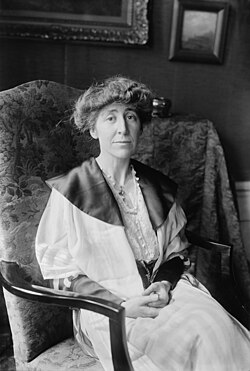Jeannette Rankin Quote
What one decides to do in crisis depends on one's philosophy of life and that philosophy cannot be changed by an incident. If one hasn't any philosophy in crises others make the decision.
Jeannette Rankin
What one decides to do in crisis depends on one's philosophy of life and that philosophy cannot be changed by an incident. If one hasn't any philosophy in crises others make the decision.
Tags:
problems
Related Quotes
It is as difficult for most poor people to truly believe that they could someday escape poverty as it is for most wealthy people to truly believe that their wealth could someday escape them.
Mokokoma Mokhonoana
Tags:
a breeze, a cinch, a piece of cake, a snap, arduous, arduousness, arrogance, arrogant, back breaking, bankrupt
About Jeannette Rankin
Jeannette Pickering Rankin (June 11, 1880 – May 18, 1973) was an American politician and women's rights advocate who became the first woman to hold federal office in the United States. She was elected to the U.S. House of Representatives as a Republican from Montana in 1916 for one term, then was elected again in 1940. Rankin remains the only woman ever elected to Congress from Montana.
Each of Rankin's congressional terms coincided with the initiation of U.S. military intervention in both world wars. A lifelong pacifist, she was one of 50 House members who opposed the declaration of war on Germany in 1917. In 1941, she was the sole member of Congress to vote against the declaration of war on Japan following the attack on Pearl Harbor.
A suffragist during the Progressive Era, Rankin organized and lobbied for legislation enfranchising women in several states, including Montana, New York, and North Dakota. While in Congress, she introduced legislation that eventually became the 19th Constitutional Amendment, granting unrestricted voting rights to women nationwide. She championed a multitude of diverse women's rights and civil rights causes throughout a career that spanned more than six decades. In 1920, she helped found the American Civil Liberties Union and served as a vice president.
Each of Rankin's congressional terms coincided with the initiation of U.S. military intervention in both world wars. A lifelong pacifist, she was one of 50 House members who opposed the declaration of war on Germany in 1917. In 1941, she was the sole member of Congress to vote against the declaration of war on Japan following the attack on Pearl Harbor.
A suffragist during the Progressive Era, Rankin organized and lobbied for legislation enfranchising women in several states, including Montana, New York, and North Dakota. While in Congress, she introduced legislation that eventually became the 19th Constitutional Amendment, granting unrestricted voting rights to women nationwide. She championed a multitude of diverse women's rights and civil rights causes throughout a career that spanned more than six decades. In 1920, she helped found the American Civil Liberties Union and served as a vice president.
